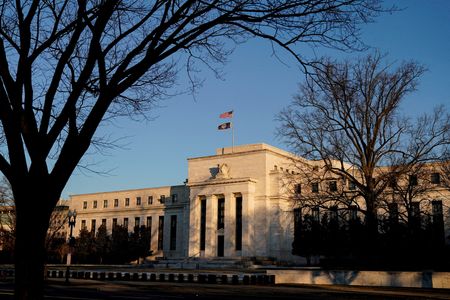By Indradip Ghosh
BENGALURU (Reuters) – The U.S. Federal Reserve will raise interest rates at least twice more in coming months, with the risk they go higher still, according to a majority of economists in a Reuters poll who see no cut by year-end.
This brings the majority of private-sector forecasters in line with the central bank’s own projections and rhetoric, leaving financial market traders alone in clinging on to hopes rates will start falling later this year.
Thanks to much stronger than expected U.S. jobs data earlier this month, Fed policymakers, including Fed chair Jerome Powell, have reiterated a higher-for-longer mantra that market traders have been fighting for months.
With inflation still at more than twice the Fed’s 2.0% target, 46 of 86 economists in the Feb. 8-13 Reuters poll predicted the U.S. central bank will go for two more 25 basis point hikes, in March and May, not just March.
That would mean a peak of 5.00%-5.25%, 25 basis points higher than what the majority had been predicting since November. All 37 who replied to an extra question said the bigger risk was the fed funds rate would peak even higher.
“We currently expect two more hikes…But the risk is towards higher rates. The labor market remains strong and it’s going to take a bit more time for it to start showing signs of deterioration,” said Oscar Munoz, U.S. macro strategist at TD Securities, who changed his forecast last month.
“That puts the risk of keeping services inflation and wage growth elevated for quite a bit and that’s going to filter back into inflation. That means the Fed is going to keep the policy rate at high levels for quite a bit longer.”
The most recent U.S. inflation data is due to be released later on Tuesday and could change the rate outlook a bit more.
The consumer price index (CPI) is forecast to have risen 0.5% on the month in January with the core index, which strips out food and energy, rising 0.4%, according to a separate Reuters survey. Those follow more mild readings for December.
There was no clear consensus on the Fed’s policy rate at the end of 2023. But over two-thirds of respondents in the latest survey, 54 of 80, forecast no cut this year as inflation was expected to remain above target at least until 2024.
One-third, or 18 of those 54 economists, predicted the fed funds rate would peak at 4.75%-5.00% and hold there through the remainder of the year. The remaining 26 of 80 economists predicted at least one cut by then.
The poll also found a median 60% probability of recession in the coming year, upgraded slightly from 56% in January.
But that will not be enough to prompt rate cuts until 2024.
“Cutting shortly after an unsettling inflation surge with a still-tight labor market would risk reputational damage if inflation flared back up,” said David Mericle, chief U.S. economist at Goldman Sachs.
“The (Fed) needs to keep the economy on a below-potential growth path for a while longer in order to further rebalance the labor market and create the conditions for inflation to settle sustainably at 2%.”
The world’s biggest economy was expected to grow only 0.7% this year before rebounding to 1.2% growth in 2024, still well below its long-term average of around 3%.
The unemployment rate, currently at the lowest since 1969, was expected to climb to 4.8% in Q1 2024, by which time most economists were expecting at least one rate cut. But that rate would be very low compared to previous recessions.
Asked which was more likely to compel a rate cut, 21 of 35 economists said a significant fall in inflation, with 14 saying a significant rise in unemployment.
(For other stories from the Reuters global economic poll:)
(Reporting by Indradip Ghosh; Polling by Sujith Pai and Susobhan Sarkar; Editing by Hari Kishan, Ross Finley and Sam Holmes)

